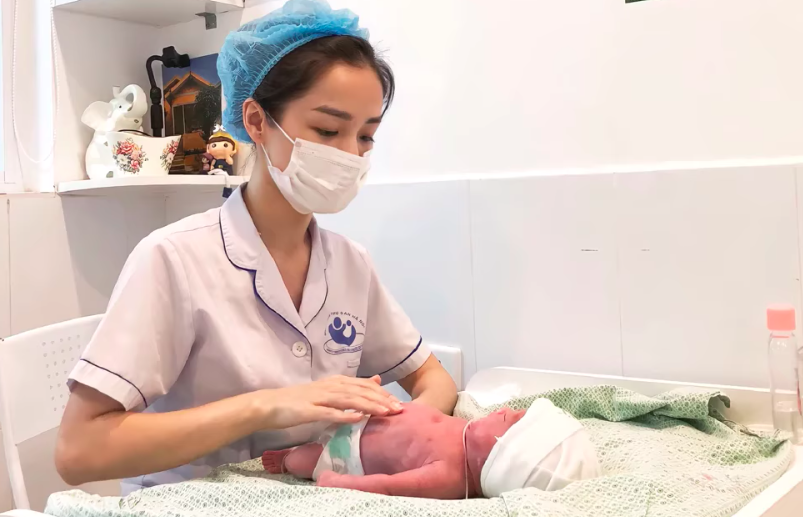
1. Preparing new radioactive drugs
In November 2023, for the first time, a hospital in Vietnam, Cho Ray Hospital, successfully prepared two new radioactive drugs used in PET/CT scanning - Ga-68 PSMA for treating prostate cancer and Ga-68 PSMA for treating neuroendocrine tumors.
Within one month, 12 cases of prostate cancer and nine cases of neuroendocrine tumors were treated with PET/CT imaging with new radioactive drugs.
The use of the two radioactive drugs was approved by the US Food and Drug Administration in 2020 and 2016, and they have been used widely. However, not all countries can produce Ga-68 PSMA and Ga-68 Dotatate. Previously, patients had to go abroad to have PET/CT scanned with the two drugs.
2. Setting up special operating bed for newborn with heart disease
In order not to miss a second to save the life of a newborn baby with severe arrhythmia in the womb, on October 9, 2023, surgeons of two end-line hospitals, Hanoi Obstetrics Hospital and Pediatrics Central Hospital, designed a special operating room with a cardiac intervention table put next to a cesarean section table.
Tens of doctors at the hospitals had only 16 hours instead of two weeks to prepare the special operating room. On October 10, the cesarean section was done. The baby girl was born weighing 2.1 kilograms, with a heart rate of only 50 beats/minute, sometimes down to 35 beats/minute, which caused heart failure.
Fifteen minutes later, the baby with a heart just equal in size to a finger was placed with an artificial pacemaker. When the ventricular rate increased to 120 beats per minute, she was brought to the Central Pediatrics Hospital nearby for intensive treatment.
3. Liver transplant
The patient was a 15-year-old girl from Quang Binh, who suffered from liver cancer, and a liver transplant was the only method to maintain her life. Her grandmother was the organ donor, but she and her grandchild did not have the same blood type (ABO blood type incompatibility).
In Vietnam, at that time, organ transplantation from ABO blood group incompatibility had been performed on kidney transplant patients and on liver transplant patients in children, but not in adults.
On October 30, an 8-hour laparoscopic surgery to take a piece of the grandmother's right liver to transplant into her granddaughter was performed by doctors of the Military Hospital 108. One week after the surgery, the patient recovered well.
4. Feeding a newborn weighing only 400 grams
A baby girl, Binh An, was born in July in Hanoi in the 26th week of pregnancy, weighing only 400 grams.
Many operations were carried out to rescue the girl. After that, she was given nutritional infusions using longline technique and treated with antibiotics to treat severe infection. After four months, the baby developed normally with the weight of 2.1 kilograms.
Binh An was the most premature baby with the lightest weight ever who has been saved by doctors. Previously, in 2021, doctors at the Central Obstetrics Hospital successfully raised a baby girl born in the 27th week of pregnancy, weighing 400 grams.
5. Mastering whole-body radiotherapy techniques for cancer patient
The patient was a woman, 46, from Binh Duong province, who was hospitalized in July 2022 diagnosed with lymphoma. Six years ago, she was diagnosed with the disease and received chemotherapy. The disease recurred in 2019 and 2021 but chemotherapy was no longer effective.
The patient received total body radiotherapy for three days, twice a day, under special conditions. After that, she received a stem cell transplant (the patient's sister was the bone marrow donor) and was discharged after 45 days. After five months of discharge from the hospital, the patient returned to normal life.
6. US technique applied successfully in Vietnam
In early September 2023, M, 6, from Hung Yen province became the first child in Southeast Asia receiving surgery to place electrodes on the cerebral cortex to map the epileptogenic area. The surgery was performed by surgeons of the Central Pediatrics Hospital with the technique transferred from the US.
The technique was effective. The child did not have to take anti-epileptic drugs after the surgery. In the US, this kind of surgery costs $150,000 (VND3.5 billion). In addition, patients have to pay for drugs and treatment process. A depth electrode costs about $1,500.
Vo Thu